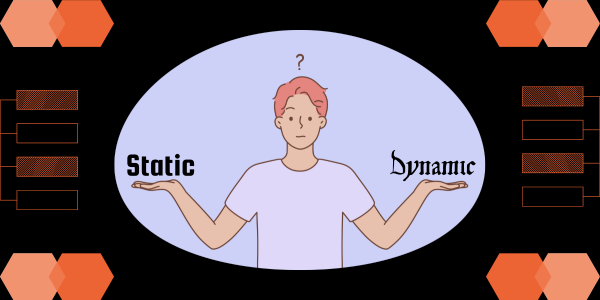If you are interested in creating a website but are confused about which website is better static or dynamic, then I will clear your doubts in this post.
Actually, a few of my readers asked me a few questions regarding the type of website they should create after reading my previous blog about creating the website. In this blog, I have written a few lines about static websites.
Read 3 Ways to create a website
To know which website is better for you we should know the types of websites you can create. There are two types of websites that you can create. One is static and the other is dynamic.
What is a Static Website
A static website is a collection of web pages displaying the same content to every visitor. It's like an informative digital brochure. A static website is a type of website where the content is fixed and does not change unless manually updated by a developer.
In other words, every visitor to a static website sees the same content ie the home page, contact page, about us page and product or service page. These websites are typically built using only HTML, CSS, and sometimes a bit of JavaScript for interactive elements. Static websites are suitable for scenarios where the content does not need to change frequently or dynamically.
Common examples of static websites include personal blogs, portfolio websites, landing pages, and small business websites.
Here are some key characteristics of static websites:
Fixed Content: The content of a static website remains the same for all visitors unless it is manually updated by editing the source code.
Simple Technology Stack: Static websites are usually built using basic web technologies such as HTML for content structure, CSS for styling, and JavaScript for interactive elements. They do not require server-side processing or databases.
Fast Performance: Because the content is pre-rendered and served directly to the user without any additional processing, static websites tend to load quickly and have fast response times.
Low Maintenance: Once a static website is created and deployed, it requires minimal maintenance since the content rarely changes. Updates typically involve making changes to the source code and redeploying the website.
Scalability: Static websites can be easily scaled since they do not rely on server-side processing or databases. They can handle high traffic volumes without requiring additional server resources.
Overall, static websites are a straightforward and cost-effective solution for publishing content that doesn't need frequent updates or complex interactions.
What is a Dynamic Website
A dynamic website is the opposite of a static website - it delivers an experience that can change based on various factors. Think of it as a website that adjusts to its visitors.
A dynamic website is a type of website that generates content on the fly in response to user interactions or data inputs. Unlike static websites, where the content remains fixed unless manually updated, dynamic websites can change their content dynamically based on various factors such as user preferences, login status, or database queries. Moreover, the content is added regularly.
Here are some key characteristics of dynamic websites:
Dynamic Content Generation: Content on a dynamic website is generated dynamically, meaning it can change based on user interactions or other factors. This allows for personalized user experiences and real-time updates.
Server-Side Processing: Dynamic websites typically use server-side scripting languages such as PHP, Python, Ruby, or JavaScript (with Node.js) to generate content dynamically. These languages allow the server to process requests, interact with databases, and generate customized content for each user.
Database Integration: Dynamic websites often rely on databases to store and retrieve information. This allows them to manage large amounts of data, such as user profiles, product catalogues, or content archives, and display it dynamically as needed.
Interactivity: Dynamic websites can include interactive elements such as forms, user authentication systems, shopping carts, and content management systems. These features enable users to interact with the website in meaningful ways, such as submitting data, making purchases, or accessing restricted content.
Complex Functionality: Dynamic websites can handle complex functionality, such as e-commerce transactions, content delivery networks, social media integrations, and real-time communication. They can adapt to user input and provide tailored responses based on the context.
Maintenance Requirements: Dynamic websites may require more maintenance than static websites, as they involve server-side processing, database management, and potentially frequent updates to content or functionality.
Overall, dynamic websites offer greater flexibility and interactivity compared to static websites, making them well-suited for applications that require personalized user experiences, real-time updates, and complex functionality.
Examples of dynamic websites include social media platforms, online stores, web applications, and content management systems.
Difference between static and dynamic websites
Reading details about static and dynamic websites I hope you understand the difference. Let us summarise the difference. Static and dynamic websites differ primarily in how their content is generated and served to users.
Content difference between the static and dynamic websites:
In a static website, the content remains fixed unless manually updated by a developer. This means that every visitor to the website sees the same content, regardless of factors like their location or previous interactions with the site.
While dynamic websites generate content on the fly, often in response to user interactions or data inputs. Content can vary based on factors such as user preferences, login status, or database queries.
Technology difference between static and dynamic websites
Static websites are typically built using only HTML and CSS. They may include some client-side scripting using JavaScript for interactive elements, but the content itself does not change based on user input or other external factors.
Dynamic websites typically use server-side scripting languages like PHP, Python, Ruby, or JavaScript (with Node.js) to generate content dynamically. They often rely on databases to store and retrieve information, allowing for personalized user experiences and real-time updates.

Advantages of static and dynamic websites:
Static websites are simple to create and host, and they are generally faster to load because the content is pre-rendered and served directly to the user without any additional processing. Moreover, it is affordable.
On the other hand, dynamic websites are highly flexible and scalable, allowing for personalized user experiences and dynamic content updates. They can handle complex interactions and large amounts of data more efficiently than static websites.
Disadvantages of static and dynamic websites:
The major disadvantage of a static website is its limited interactivity. Moreover, updating content requires modifying the code for each page.
On the other hand, a dynamic website is more complex and expensive to build and maintain. Furthermore, it is potentially less secure due to the added complexity.
Conclusion:
Decide what is your goal from your website. Whether you just wanted an online presence or do business from your website.
If you just want an online presence go for a static website. And if you want to grow your business online then a dynamic website will be better for you. Consider the difference between static and dynamic websites to choose the right website for you.













0 Comments